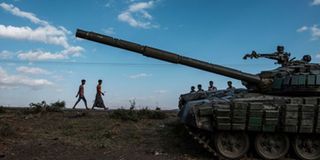400,000 people facing famine in war-torn Tigray: UN

What you need to know:
- This week, Ethiopian forces destroyed two key bridges allowing desperately-needed aid into the region, prompting charges Addis Ababa was seeking to choke off humanitarian assistance.
Over 400,000 people have "crossed the threshold into famine" in Ethiopia's war-torn Tigray region, a senior UN official said Friday, appealing for urgent humanitarian action to help the millions affected by the brutal eight-month long conflict.
Fighting between the Ethiopian government and the Tigray People's Liberation Front (TPLF) was reignited last month when the rebels launched a major counter-offensive that saw them retake their regional capital of Mekele.
This week, Ethiopian forces destroyed two key bridges allowing desperately-needed aid into the region, prompting charges Addis Ababa was seeking to choke off humanitarian assistance.
Friday saw the UN Security Council hold its first public meeting on a conflict that has left thousands of dead and plunged hundreds of thousands into hunger.
Ramesh Rajasingham, Acting Under-Secretary-General for Humanitarian Affairs and Emergency Relief Coordinator, told that meeting that the situation had "worsened dramatically" as the conflict had reignited in recent weeks.
"More than 400,000 people are estimated to have crossed the threshold into famine and another 1.8 million people are on the brink of famine," he said. "Some are suggesting that the numbers are even higher. 33,000 children are severely malnourished."
"The lives of many of these people (in Tigray) depend on our ability to reach them with food, medicine, nutrition supplies and other humanitarian assistance," he added. "We need to reach them now. Not next week. Now."
Ethiopia has rejected charges that it planned to choke off aid to the region."
The insinuation that we are planning to suffocate the Tigrayan people by denying humanitarian access and using hunger as a weapon of war is beyond the pale," Deputy Prime Minister Demeke Mekonnen told diplomats gathered at a hotel in the capital Addis Ababa.
Officials are "using every ounce of our strength to extricate" Tigrayan civilians "from the dire situation they find themselves in", he added.
Ceasefire 'a joke'
Prime Minister Abiy Ahmed, winner of the 2019 Nobel Peace Prize, sent troops into Tigray last November to detain and disarm leaders of the regional ruling party, the Tigray People's Liberation Front (TPLF).
He said the move was in response to TPLF attacks on federal army camps, and declared victory within weeks after federal forces took the regional capital Mekele.
But after the rebels -- having rebranded themselves the Tigray Defence Forces (TDF) -- retook Mekele and asserted control over most of the region, the government announced a unilateral ceasefire that the TDF has dismissed as "a joke".
Senior UN official Rosemary DiCarlo urged the group Friday to "immediately and completely" endorse the ceasefire.
"A ceasefire observed by all parties would not only facilitate the provision of humanitarian aid but would also be a starting point for the necessary political efforts to chart a way out of the crisis," DiCarlo said.
The war has already exerted a staggering humanitarian toll, with the United States estimating 900,000 civilians are "likely already experiencing famine conditions".
The UN's World Food Programme (WFP) says 5.2 million people, or 91 percent of Tigray's population, need emergency food assistance.
'Lives will be lost'
On Friday, the WFP said it had resumed aid operations after a two-day pause but added that lives were still in the balance after the two major bridges leading into Tigray were destroyed.
"Lives will be lost if supply routes into Tigray do not fully open and parties to the conflict continue to disrupt or endanger free movement of cargo for WFP and other emergency responders."
The UN has said one of the bridges was "reportedly" blown up by security forces from the Amhara region, south of Tigray, but the government on Friday blamed Tigrayan forces.
In his comments to diplomats Friday, Demeke reiterated the government's position that the ceasefire was motivated by humanitarian concerns and to facilitate farming.
But with electricity and telecommunications cut off, flights suspended and most roads into the region now impassable, UN officials and diplomats fear the situation could deteriorate further."
A credible ceasefire means doing everything possible so that aid reaches the millions of children, women and men who urgently need it," EU foreign policy chief Josep Borrell said on Twitter.
Path to dialogue?
Demeke also said that, following national elections last month that are expected to give Abiy a new term, the government was preparing for an "inclusive dialogue" to resolve the crisis. The polls were postponed in Tigray.
Such a dialogue has long been sought by diplomats lobbying for a political resolution of the war. But in a closed question-and-answer session with diplomats, officials indicated that dialogue with the TPLF leadership remained off the table.
In May lawmakers designated the TPLF a terrorist organisation.
When pressed by diplomats on how that might affect whatever dialogue takes place, Demeke said some TPLF members were "innocent" and could be included, according to three attendees.
But both Demeke and Redwan Hussein, spokesman for a government task force on the Tigray conflict, told diplomats that Addis Ababa was committed to "accountability" for TPLF leaders, the diplomats said.





